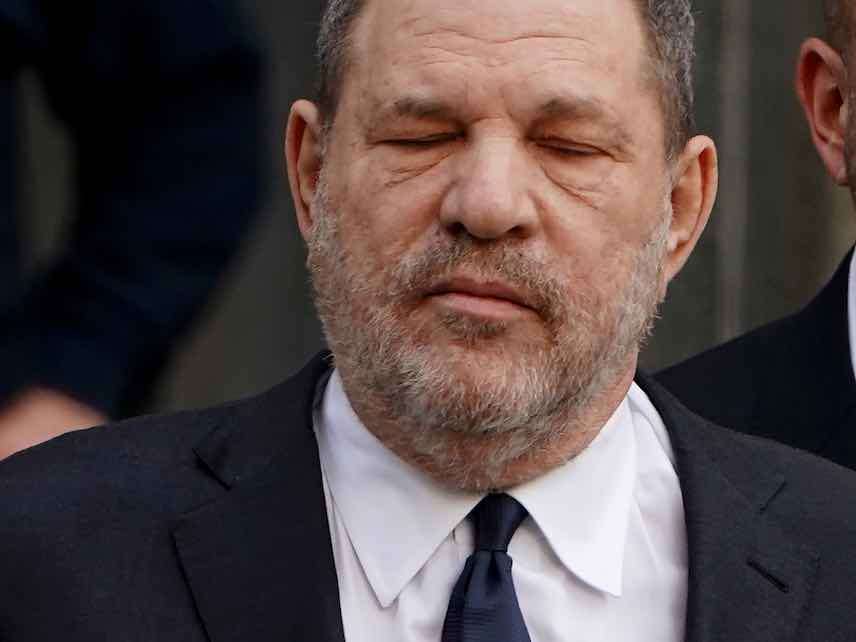A Harvard Law Professor Is Representing Harvey Weinstein. Students Say This Makes Them Unsafe, Demand His Resignation.
Ronald Sullivan's choice of clients is "not only upsetting, but deeply trauma-inducing," according to activist students.

Ronald S. Sullivan Jr. is a law professor at Harvard University and faculty dean of Winthrop House, one of the college's 12 residential houses. He was the first black man to serve in such a position, and also directs Harvard's Criminal Justice Institute and Trial Advocacy Workshop. In 2008, he advised the campaign of then-Sen. Barack Obama on criminal justice issues. He represented Michael Brown's family in their suit against the city of Ferguson, Missouri, and his work has led to the release of over 6,000 wrongfully incarcerated people.
You might expect Sullivan to be in good standing with the progressive activist community at Harvard. You would be wrong.
Earlier this month, more than 50 students attended a protest demanding that Sullivan resign his position as dean over alleged #MeToo failings. The Association of Black Harvard Women also wants him gone. "What has been made especially clear is that you have failed us," they wrote in a letter. "You have failed the Black women in this community, not only as one of the few Black Faculty Deans on campus but also as a community leader—someone who we respected and looked to for guidance."
Notably, Sullivan himself has not been accused of sexual misconduct or any #MeToo-related wrongdoing. But he has agreed to represent disgraced movie executive Harvey Weinstein, who was accused of sexual harassment and assault by multiple women—and that in and of itself is apparently an unforgivable offense, in the eyes of victims' rights advocates.
Harvard's administration is taking students' concerns seriously, and has agreed to conduct a review of Sullivan.
"In this situation, we would like to have a more complete understanding of the current environment at Winthrop House," wrote Dean of the College Rakesh Khurana in an email, according to The Harvard Crimson.
One of The Crimson's own staff members*, Danukshi Mudannayake, is spearheading the effort to remove Sullivan. She started a change.org petition that claims his representation of Weinstein as "not only upsetting, but deeply trauma-inducing." According to Mudannayake, Sullivan has made clear that he does not "value the safety of students he lives with in Winthrop House."
These concerns are, to put it mildly, absurd. Weinstein is not his first loathsome client; Sullivan also represented former NFL player Aaron Hernandez, who was convicted of murder. Every person accused of a crime deserves competent legal representation—even Weinstein and Hernandez. It's abundantly clear that Sullivan takes the principled liberal view that due process matters, and that the accused deserve fairness in the criminal justice system. His entire career is built on these ideas. Agreeing to represent an accused sexual abuser is not an endorsement of sexual abuse.
It's extremely disappointing to see the administration humor the students' misguided notion that Sullivan's choice of clients somehow makes Winthrop an unsafe place, but Khurana's statements have given some credence to this view.
"I take seriously the concerns that have been raised from members of the College community regarding the impact of Professor Sullivan's choice to serve as counsel for Harvey Weinstein on the House community that he is responsible for leading as a faculty dean," wrote Khurana. "I have also met with Professor Sullivan to discuss his responsibilities to the House and have communicated that the College believes that more work must be done to uphold our commitment to the well-being of our students."
The Foundation for Individual Rights in Education's Samantha Harris lamented that "the Harvard administration is taking these demands—which boil down to calls to penalize and marginalize a criminal defense attorney for defending criminals—seriously."
This episode is yet more evidence that modern progressive activism is regrettably at odds with previously cherished progressive values. For many on the left, free speech and due process are not principles to defend, but obstacles to overcome.
*Update: I initially described Mudannayake as an editor, which is how The Harvard Crimson refers to her. However, it seems the paper uses the term "editor" for most entry-level staff members, even if they are not managers. The actual editors enjoy fancier titles.


Show Comments (164)